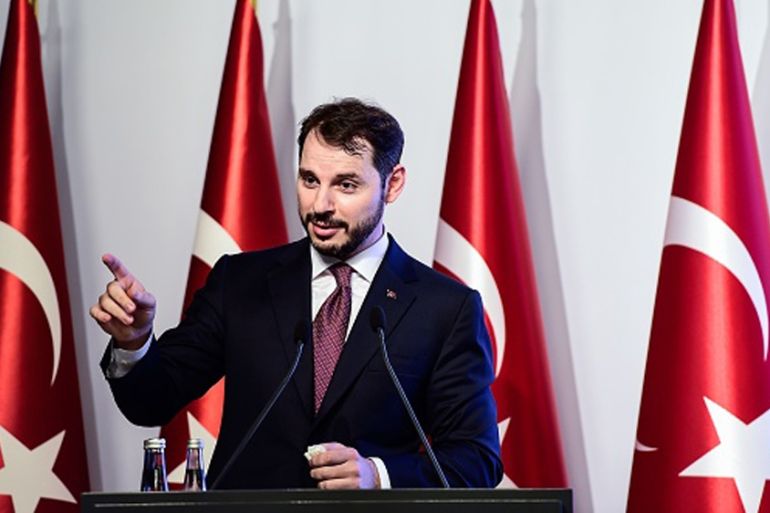Berat Albayrak: Turkey to emerge ‘stronger’ from currency crisis
Turkish finance minister rules out IMF assistance and capital controls in address to international investors.

Turkey’s finance minister has ruled out any assistance from the International Monetary Fund or any moves to limit money flows as he reassured investors that Turkey will come out of the current currency crisis “stronger” than before.
Berat Albayrak made the comments on Thursday during a teleconference with thousands of international investors and economists to provide an update about the state of Turkey’s economy, amid a diplomatic dispute with the US that has seen tariffs from both sides pile up and the lira plunge.
Keep reading
list of 4 itemsFacebook, Instagram face EU scrutiny over addictive effects on children
Who benefits from US tariffs on Chinese imports? Experts weigh in
Biden slaps new tariffs on Chinese imports, ratcheting trade war
“There is no IMF plan; we have focused on attracting direct investments,” Albayrak was quoted as saying by broadcaster TRT.
His comments came a day after Qatari Emir Sheikh Tamim bin Hamad Al Thani announced a $15bn investment to boost Turkey’s economy following talks with Turkish President Erdogan in the Turkish capital of Ankara.
Lira picks up
The lira has been sliding for months, but its recent plunge began last week after US President Donald Trump announced on Twitter a doubling of steel and aluminium tariffs.
The lira subsequently lost almost a quarter of its value in two days, with Trump’s move adding pressure on an economy already roiled by high inflation, which is approaching 16 percent.
However, the lira managed to pick up on Wednesday, firming 5.75 against the dollar – more than five percent in gain – and stood at 5.80 on Thursday morning.
Albayrak, who was appointed to the cabinet in July and is also Turkish President Erdogan’s son-in-law, said in the call that Turkey will navigate this period of US sanctions with other parties such as Germany, Russia and China.
Albayrak also said that Turkey will provide support to the banking sector, which was capable of managing current volatility and that there has not been major deposit flow from banks lately. Turkey will announce additional sources of funding in the next few weeks, he added.
Turkish Treasury Minister Albayrak:
• No capital controls would be ever imposed
• No IMF stand-by deal instead will focus on FDI
• Don’t expect U.S. fine against Halkbank
• Support and additional funding would be provided to banks if necessary— Ragıp Soylu (@ragipsoylu) August 16, 2018
Moreover, Albayrak said capital controls will never be on the agenda, adding that Turkey will ensure further fiscal tightening, with a focus on boosting its primary surplus.
The 40-year-old finance minister also reassured investors that the government will see certain expenditure cuts and the revenue side was showing positive performance, adding that he expected a 6 billion Turkish lira ($1.04bn) primary surplus for the end of this year.
“We are targeting lowering inflation into the single digits as soon as possible,” Albayrak said.
Cristiana de Alessi, from BNP Paribas Asset Management, said Albayrak “provided some comfort by acknowledging that rebalancing the economy is a priority through both fiscal and monetary policy and that capital controls are not an option.
She told the Reuters news agency: “The MTP (medium-term programme) released in September will be key to see what concrete steps will be taken to turn this into sustained action. It will also provide a benchmark to measure the new government’s progress.
“My main concern is a lack of contingency plan if debt cannot be rolled over or if a slower growth rate exacerbates corporate NPLs. Turkey may require a stronger adjustment than is currently in their plans.”
New markets
Turkey’s relations with the US, its NATO ally, have deteriorated into one of the worst crisis in bilateral ties in years.
The two NATO allies remain at loggerheads over multiple issues ranging from diverging interests in Syria to Ankara’s expressed desire in purchasing Russia’s S400 anti-missile system, as well as the lingering case of an Evangelical pastor who is on trial in Turkey on terrorism charges.
US Treasury Secretary Steven Mnuchin said on Thursday the US was ready to put further sanctions on Turkey if the detained American pastor Andrew Brunson were not released.
During a cabinet meeting at the White House, Trump called pastor Andrew Brunson “a very innocent man” and asked for an update on sanctions imposed against Turkish cabinet members.
“We have more that we’re planning to do if they don’t release him quickly,” Mnuchin said.
Erdogan, meanwhile, has said Turkey’s partnership with the US is in jeopardy, warning Ankara could start looking for new allies.
|
|
But on Wednesday evening, Turkey’s Foreign Minister Mevlut Cavusoglu adopted a conciliatory tone, telling a group of foreign ambassadors in Ankara that Turkey was “ready to talk about everything” with the US to solve the disputes.
However, Cavusoglu added that Ankara would not accept any threatening or dictating.
Turkey has also in recent days shown it is willing to repair ties with Europe after a crisis sparked by Ankara’s crackdown on alleged plotters of a 2016 failed coup attempt.
Erdogan and his French counterpart Emmanuel Macron agreed in a phone call Thursday to foster trade ties, a Turkish presidential source said.
Albayrak on Thursday spoke with his German counterpart Olaf Scholz on the phone, where the two ministers agreed to “take steps in order to reinforce economic cooperation,” Albayrak’s office said.